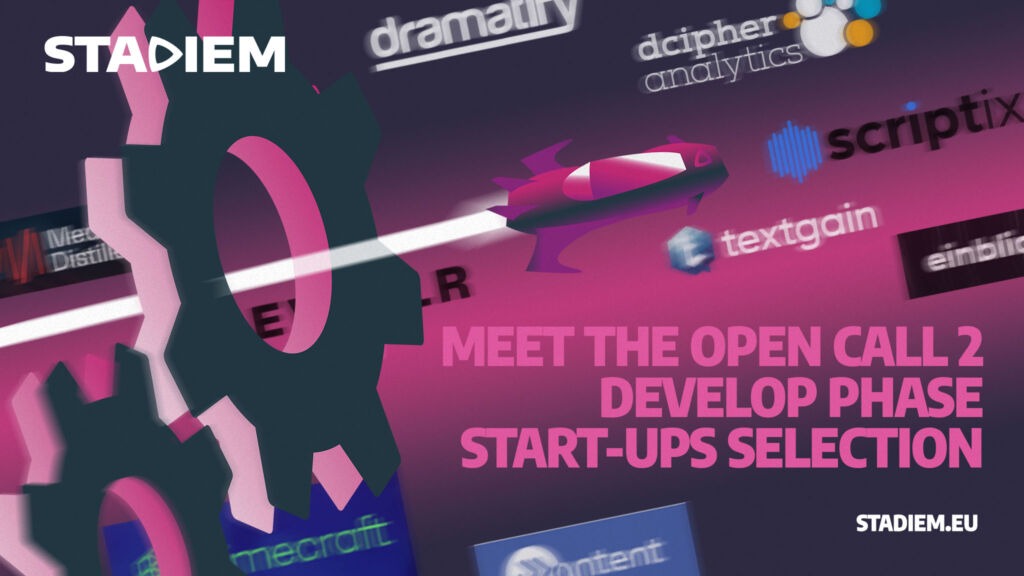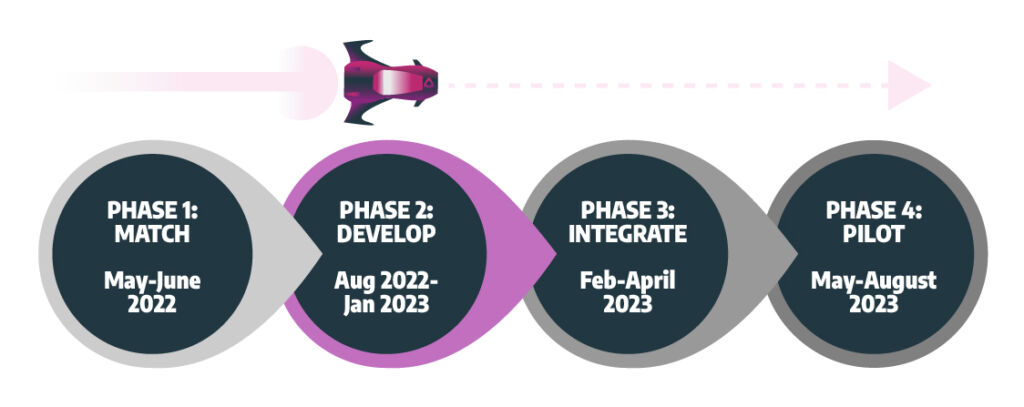
It’s Develop phase time for the Open Call 2 start-ups cohort! 16 out of the initial 40 selected will now join forces with international media organisations to collaborate on topics such as data, content creation and content verification against disinformation. The OC2 Develop phase, which will run for the next 6 months, kicks off officially on August 1, 2022 – Let’s discover who’s in:
The sTART-UPS (BY FOCUS AREA)
Content verification and against disinformation
Textgain (Belgium) – Text analytics pipelines able to automatically perform user profiling, keyword extraction and opinion mining on a large scale.
Monetization
Druid Learning (Ireland) – A white-label educational content e-commerce platform designed with inclusiveness in mind, allowing publishers to control, manage and distribute their digital content directly to their end users.
Vialog (UK) – Vialogs are embeddable video discussions for websites, products or events – to increase engagement, sign-ups or sales. The feature is not app-based, working on all browsers through the simple implementation of a 1-line code snippet into a website.
Levellr (UK) – A SaaS business helping power messaging communities: a “Mailchimp for messaging” designed to enhance and support this the leading communication format by pushing simultaneously to Discord, Telegram and Slack.
Data/AI/ML/Synthetic Media
Dcipher Analytics (Sweden) – A no-code text-to-insights company with a scalable cloud-based end-to-end saas-platform, providing all the latest and best tools required to do any text analytics or automation project at once.
Limecraft (Belgium) – Limecraft’s cloud-based collaboration platform ‘Limecraft Flow’ is used by media producers worldwide to manage their workflow, allowing them to create more content faster: built-in AI allows automation of several steps in the production process, including raw material processing, audio transcription and subtitling.
Scriptix (The Netherlands) – A full-service speech recognition provider featuring an ecosystem of (custom) speech-to-text models and additional services, aimed at enabling everybody to turn spoken word into text.
einbliq.io (Germany) – Broadcasters and OTT companies are facing ever-growing streaming costs, mainly paid to Content Delivery Networks (CDN). With an all-embracing data analytics suite, einbliq.io, helps media companies delivering excellent and quality assured streaming services at lower cost.
Media Distillery (The Netherlands) – Through AI technology, Media Distillery creates enhanced viewing experiences, enabling faster access to relevant content and optimised advertising that boosts viewer engagement.
Content creation & distribution
BotTalk (Germany) – BotTalk’s technology focuses on text-to-speech, allowing publishing houses with an average output of 200 news articles a day to create 8 to 30 hours of audio daily from it.
Wantent (Ukraine) – Wantent is a unique AI-based platform that identifies consumer reactions to video content, applying ML technologies.
Rumble Studio (France) – Rumble Studio lets anyone in a company create audio content (such as marketing-aimed podcasts) quickly and easily, with cutting-edge voice technology via a-synchronic interview recordings.
IZI RECORD (Spain) – IZI has created a technology that allows users to easily enhance their video content using videos from other users attending the same event. These videos will be created in seconds with an added AI layer that makes them unique for each user.
Television.AI (Germany) – AI to unlock insights from raw video footage (such as common objects, sentiments, emotions, faces, well-known people, topics, etc.) to be used for SEO, archive indexing, and even automatically create edits featuring synthetic voice over.
doWow (Germany) – The world’s first omni-channel content distribution and curation solution, allowing anyone to create interactive and curated content broadcast to any dimension, without requiring any coding expertise.
Dramatify (Sweden) – A B2B SaaS cloud solution giving the creative and production teams overview, creativity and control while automating workflows: thus not only saving hundreds of work hours per production but also allowing for co-productions, remote productions and hybrid workplaces.
WHERE IS THE DEVELOP PHASE IN THE PROGRAMME TIMELINE AND WHAT’S NEXT?

The Develop phase in the second step of STADIEM’s piloting and acceleration programme, and the longest one: in the 6 months between August 2022 and January 2023, the selected start-ups are set on a co-creation trajectory with the corporates met during the Match phase, to develop a media solution tailored to the needs of said corporates.
The names of the corporate partners involved in OC2’s Develop phase will be revealed at the end of August.
Only a further selection of 12 will eventually move on to phase three – the Integrate phase – in which they will begin technical integration and testing, or pre-pilot activities for public pilots, around their innovative Next Generation Media ideas. This will also include internal testing and evaluation of business processes and performance, technologies, and solutions that will enable and drive forward scale-up and corporate collaboration.
Keep up to date with the progress of start-ups from both OC1 and OC2 cohorts – Subscribe to STADIEM’s newsletter or follow us on social media for updates!

